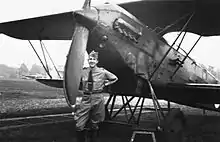Royal Netherlands East Indies Army Air Force
The Royal Netherlands East Indies Army Air Force (Dutch: Militaire Luchtvaart van het Koninklijk Nederlands-Indisch Leger, ML-KNIL) was the air arm of the Royal Netherlands East Indies Army in the Dutch East Indies (now Indonesia) from 1939 until 1950. It was an entirely separate organisation from the Royal Netherlands Air Force.
| Royal Netherlands East Indies Army Air Force | |
|---|---|
| Militaire Luchtvaart van het Koninklijk Nederlands-Indisch Leger | |
 | |
| Active | 1915–1950 |
| Country | Netherlands |
| Branch | Royal Netherlands East Indies Army |
| Type | Air force |
| Role | Aerial warfare |
| Aircraft | See list below |
| Engagements | World War II Indonesian War of Independence |
| Commanders | |
| Notable commanders | See list below |
| Insignia | |
| Roundel circa 1921–1939 & 1948–1950 |  |
| Roundel 1939–1942 |  |
| Roundel 1942–1948 |  |
The unit was founded in 1915 as the "Test Flight Service" (Proefvliegafdeling-KNIL, PVA-KNIL). In 1921 it became the "Aviation Service" (Luchtvaartafdeling-KNIL, LA-KNIL), before finally receiving the designation of ML-KNIL on 30 March 1939. In 1950, following Dutch recognition of Indonesian independence, its bases and facilities were handed over to the Indonesian Air Force (TNI-AU).
World War II

On 1 January 1942 the Dutch forces joined the American-British-Dutch-Australian Command, but at the onset of the Japanese assault the ML-KNIL was not up to full combat strength. Of the aircraft that had been ordered, only a small number had been delivered, and many were obsolete models. There were five groups, three of bombers and two of fighters, each of three to four squadrons.[1] A sixth depot group provided support, transport and training. Reconnaissance aircraft were placed directly under command of the Army to give support to ground troops.
Despite stubborn resistance the Japanese occupied the Dutch colonies, though numbers of aircraft found their way to northern Australia to continue the fight.
Four Dutch squadrons were formed in Australia. The first of these, No. 18 (NEI) Squadron RAAF, was formed in April 1942 as a medium bomber squadron equipped with B-25 Mitchell aircraft. The second joint Australian-NEI squadron, No. 119 (NEI) Squadron RAAF, was also to be a medium bomber squadron. No. 119 NEI Squadron was only active between September and December 1943 when it was disbanded to form No. 120 (NEI) Squadron RAAF, was a fighter squadron. In 1944, the KNIL formed No. 1 Netherlands East Indies Transport Squadron, later absorbed by the RAAF as No. 19 (NEI) Squadron RAAF. Both No. 18 and No. 120 Squadrons saw action against the Japanese during World War II.
From late 1945, Nos 18, 19 and 120 squadrons fought against Indonesian nationalists, during the Indonesian National Revolution. The squadrons were disbanded in 1950.
_Squadron_RAAF_ML-KNIL_Badge_1943-1946.jpg.webp)
Aircraft
1915–1918
- Deperdussin-Léon de Brouckère Monoplane (never flown)
- Farman F.22
- Léon de Brouckère No.1 & No.2 (type reconnaissance & trainer, Farman copies)
- Glenn L. Martin Model TT
- Glenn L. Martin Model TA
- Glenn L. Martin Model TE
- Glenn L. Martin Model R
1919–1935

- Avro 504K
- Curtiss P-6E Hawk
- De Havilland DH-9
- Fokker C.IV
- Fokker C.V (D/E)
- Fokker C.X[1]
- Fokker DC.1
- Fokker D.VII
- Fokker F.VIIb-3m
- Fokker S.IV
- Morane-Saulnier AR / MS.35
- NVI F.K.31
- Pander D
- Vickers Viking
1936–1950



- Brewster B-339C/D[1] (export Brewster Buffalo)
- Bücker Bü 131 Jungmann
- Commonwealth CA-6 Wackett
- Consolidated Model 28-5MN
- Consolidated Model 28-5AMN
- Curtiss P-40E/N Kittyhawk
- Curtiss Model 75A-7[1] (export P-36 Hawk)
- Curtiss-Wright CW-21B[1]
- Curtiss-Wright CW-22 Falcon
- Douglas C-47 Dakota
- Dornier Do 24K
- Douglas C-54 Skymaster
- Douglas DC-3
- Fairchild F-24R-9
- Glenn Martin 139/166[1] (export B-10)
- Hawker Hurricane IIb
- Mitsubishi Ki-57 "Topsy"
- Koolhoven F.K.51[1]
- Lockheed 212[1]
- Lockheed 12
- Lockheed Model 18 Lodestar
- Lockheed C60 Lodestar
- Messerschmitt Bf 108B-1
- North American P-51 MustangD/K)
- Noorduyn Norseman
- North American AT-16 Harvard
- North American B-25 MitchellC/D/J
- Piper J-4E
- Piper L-4J
- Ryan STM-2
- Taylorcraft L-2 Grasshopper
- Tiger Moth
- Waco EGC-7
- Waco UKC
Commanders
- 1915 Captain C.E. Visscher
- 1917 Captain C.L. Vogelesang
- 1919 Captain C. van Houten
- 1921 Captain J.A. Roukes
- 1924 Captain P.F. Hoeksema de Groot
- 1927 Major J. Beumer
- 1928 Lieutenant-Colonel J.H. Wesseling
- 1932 Major G.A. Ilgen
- 1934 Major-General L.H. van Oyen[2]
- 1945 Major-General E.T. Kengen
- 1946 Colonel P.J. de Broekert
- 1948 Major-General C.W. van der Eem
See also
Notes
- Broshot, James A. (1999–2000). "Dutch Air Force Order of Battle in the Dutch East Indies, 30 November 1941". Forgotten Campaign: The Dutch East Indies Campaign 1941–1942.
- Klemen, L. "Air Force Lieutenant-General Ludolph H. van Oyen". Forgotten Campaign: The Dutch East Indies Campaign 1941–1942.
References
- Broshot, James A. "ML-KNIL Order of Battle 30 November 1941". The Netherlands East Indies 1941–1942. Retrieved 5 October 2010.
- Casius, Gerard J. (2003). "The Use of Air Power in the National Liberation Struggle in Indonesia 1945–49". In Brent, Keith (ed.). RAAF History Conference 2002: Air Power and Wars of National Liberation. Fairbairn, ACT: Aerospace Centre. ISBN 978-0-642-26579-1.
- "The destruction of Dutch air power in the Pacific". Australian War Memorial. Retrieved 5 October 2010.
External links
| Wikimedia Commons has media related to Royal Netherlands East Indies Army Air Force. |
- Dutch Docu Channel (1 January 2015). "Military Aviation of the Royal Netherlands East Indies Army (ML-KNIL) 1915–1950". YouTube. Retrieved 7 October 2015.
- de Groot, Bouko (2020). "Camouflage & Markings: Colours of the Dutch Air Force (Part II, first online 2004)". IPMS Stockholm. Retrieved 18 April 2020.
- Casius, Gerard J. (2014). "Brewster Buffaloes for the Militaire Luchtvaart KNIL". warbirdforum.com. Retrieved 7 October 2015.
- Safarik, Jan J. (2014). "The Netherlands: World War II". Air Aces. Retrieved 7 October 2015.
- Heyman, Jos (2011). "NEI Aircraft in Australia". ADF Serials.com.au. Retrieved 7 October 2015.